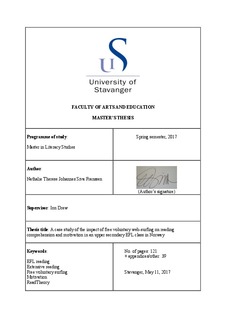| dc.description.abstract | The current study was a case study of the impact of a three-month free voluntary web surfing (FVS) programme on pupils’ reading and motivation in a Norwegian upper secondary VG2 International English classroom (elective subject). The case study group consisted of 22 pupils. Twice a week, in the course of three months, each English lesson started with a reading session of approximately 20 minutes, where the pupils could access any English speaking digital news provider.
The study aimed to find out the impact of FVS on the pupils’ reading comprehension, the pupils’ motivation to read English-speaking news online, the pupils’ reading routines, their reading interests and, finally, if FVS helped them to become more critical readers. The progress of the pupils’ reading comprehension was monitored on ReadTheory, an online reading comprehension programme. This was compared to a control group of six pupils from the other class of International English at the school.
The data consisted of a combination of both qualitative and quantitative data. The qualitative data consisted of two questionnaires answered by the whole class (one prior to the start of the programme and one post-programme), two interviews with eight focus pupils (one at the start of the programme and one when the programme was finished), observations during the reading sessions, and blog entries written by the pupils. The quantitative data consisted of the results achieved by both the case study group and the control group on the reading comprehension website ReadTheory. Triangulation between the different types of data increased the validity of the findings.
The research showed that the majority of the case study pupils were motivated by the extensive reading project. This was seen in the course of the observations, the discussions that followed the reading sessions, the blog entries, and also the data provided by the questionnaires and the interviews organized for the eight focus pupils. The research also showed that some pupils struggled to find interesting articles to read, which was confirmed by their relatively poor results on ReadTheory. These pupils did not seem to have the necessary proficiency in English to be able to read and enjoy the English-speaking online news.
The impact of the programme on reading comprehension was difficult to assess as the ReadTheory website did not seem to be a reliable tool to measure progress. Indeed, the pupils from the control group and the case study group recorded huge fluctuations in their grade level achievements from one quiz to another, with sometimes up to six grades in difference in the course of the three month period.
The results of the study generally showed that the computer is a good source of comprehensible input. The pupils enjoyed the reading of the English-speaking news digitally, most of them felt that the programme had generally helped them improve their reading comprehension, some changed their reading habits, some became more aware of the sources of the news published on their social media platforms, and most of them felt that they had gained knowledge about topics related to the English-speaking world. Even the two weakest pupils in the class felt that they had benefitted from the outcome of the programme.
The study also showed the difficulty for the pupils to avoid distractions when surfing on the web. It is important to be aware of the challenges pupils are confronted with when they can surf freely on the net and the impact online reading has on the overall understanding of the text.
Few research studies have been carried out about digital reading in upper secondary schools in Norway and few research studies in Norway have focused on the use of real-life materials in EFL teaching, such as online news. This study has therefore made a contribution by adding to the little research in this area. | nb_NO |
